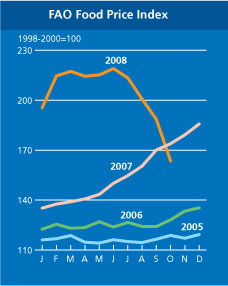- Nobellist praises biodiversity, ignores food.
- TED video on world-saving mushrooms.
- God: “Behold, I have given you every herb bearing seed, which is upon the face of all the earth, and every tree, in the which is the fruit of a tree yieleling seed; to you, it shall be for meat.“
- Pollan: “Vote with your fork, for a different kind of food. Go to the farmer’s market. Get out of the supermarket… Plant a garden… Declare your independence from the culture of fast food.”
- Rodale Institute: “Yield data just by itself makes the case for a focused and persistent move to organic farming systems.”
Food crisis almost over, people starving as usual
 Agriculture related press releases continue to start with a sentences like “The current crisis in world food prices…”. Take these three of yesterday’s posts on this blog: the above quote is from the article discussed in Great Expectations; we need induced mutations because: “The global nature of the food crisis is unprecedented”; and it is also a reason to go forth and grow halophytes: “There’s a real urgency to addressing the issue of rising food and fuel prices.”
Agriculture related press releases continue to start with a sentences like “The current crisis in world food prices…”. Take these three of yesterday’s posts on this blog: the above quote is from the article discussed in Great Expectations; we need induced mutations because: “The global nature of the food crisis is unprecedented”; and it is also a reason to go forth and grow halophytes: “There’s a real urgency to addressing the issue of rising food and fuel prices.”
Haven’t they noticed that the crisis is (almost) over? Supply is up and speculators are retracting. The first stories about complaining farmers are coming in. Perhaps I am missing the point of the long term trend of dearer oil (fertilizer) and climate change?
Either way, in a couple of months we’ll be back to business as usual. Cheap food, and,
every day, almost 16,000 children that die from hunger-related causes — one child every five seconds.
The farmers of the future
“America, we cannot turn back. Not with so much work to be done… Not with an economy to fix and cities to rebuild and farms to save.â€
Agrobiodiversity and HIV/AIDS
On World AIDS Day, it would be nice to be able to point to how agrobiodiversity can help the more than 40 million people living with HIV around the world. Not easy, alas. There’s an FAO strategy-type document from 2003. And what looks like a project from Wageningen University that’s just about to end. But very little else in the way of concrete examples, at least that I could find in the first few pages of a Google search. There was a piece today reviewing the role of nutrition in dealing with HIV/AIDS, but this mainly dealt with supplements. Can this possibly be it?
Technology is not enough, part 2
Policy makers should give as much emphasis to incentives and affordability of modern inputs as to their efforts to ensure availability of technologies. Non-technical issues are just as important. The wider innovation system, encompassing technology delivery, marketing, and wider institutional and policy issues — most notably land — must be looked at more comprehensively, if productivity boosts in grain staples is to create the wider growth effects in the economy, with advantages for poorer and richer farmers alike.
This time from Ethiopia.